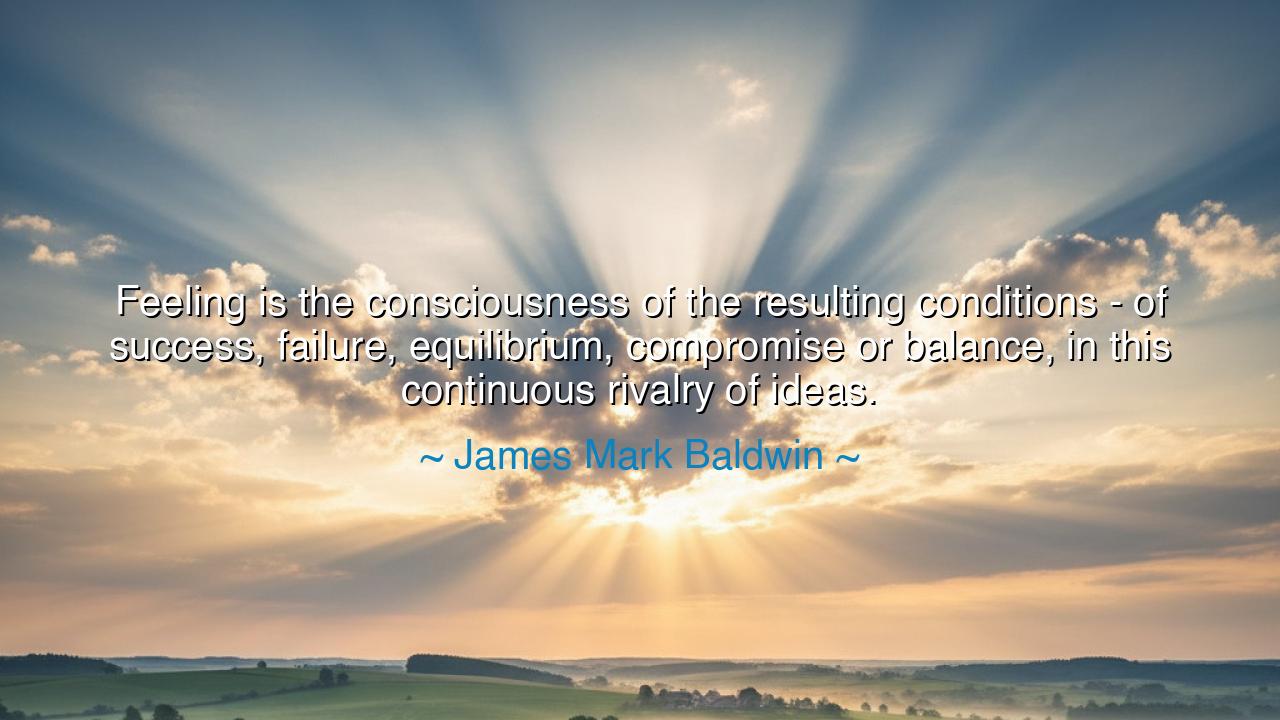
Feeling is the consciousness of the resulting conditions - of
Feeling is the consciousness of the resulting conditions - of success, failure, equilibrium, compromise or balance, in this continuous rivalry of ideas.






Host: The café was growing quieter as the evening approached, the soft hum of conversations blending with the occasional clink of silverware. The light outside had started to fade, and the world outside seemed to slow as the room filled with a calm, reflective energy. Jack and Jeeny sat at a small table, their mugs of coffee in front of them. Jack had been quiet for a moment, his fingers tracing the edge of his mug, lost in thought. Jeeny noticed his introspective mood, waiting for him to speak.
Host: Finally, Jack looked up, his voice quiet but thoughtful.
Jack: “I came across a quote by James Mark Baldwin today. He said, ‘Feeling is the consciousness of the resulting conditions — of success, failure, equilibrium, compromise or balance, in this continuous rivalry of ideas.’ It made me think about how we experience emotions — not just as reactions, but as reflections of the state we’re in, the ongoing battle between opposing forces or ideas. But how do we understand feeling in the context of all that internal conflict? Does it make sense to think of our feelings as something that results from this constant rivalry inside?”
Jeeny’s eyes softened, clearly engaged with the depth of the thought. Her voice, when it came, was calm but filled with insight.
Jeeny: “I think Baldwin is pointing out that our feelings aren’t just random or fleeting; they’re a result of how we navigate the tension between different aspects of our lives — the push and pull between opposing ideas or desires. Emotions arise as we try to make sense of conflict, whether it’s internal or external. Feeling is our awareness of that conflict and how we’re trying to find balance, equilibrium, or resolution.”
Host: Jack’s gaze shifted, clearly contemplating her words, as the weight of Baldwin’s idea settled in.
Jack: “So, you’re saying that every emotion we experience is tied to this internal process, this rivalry of ideas? It’s not just about reacting to something; it’s about how we’re trying to make sense of all the opposing forces at play?”
Jeeny nodded, her eyes steady as she continued.
Jeeny: “Exactly. Our feelings are like a reflection of our efforts to balance the different aspects of our thoughts, beliefs, and experiences. Success, failure, balance — they all come from trying to reconcile competing desires, fears, values, or perspectives. For example, when we experience success, we might feel a sense of accomplishment because we’ve resolved one side of the conflict, but the failure we feel after a setback might be a reflection of the tension between what we want and what we fear we can’t achieve. It’s about how we navigate that rivalry within us.”
Host: The quiet rhythm of the café seemed to settle between them as Jack reflected on her words. The idea of emotions as a reflection of internal conflict had shifted something in his mind, and he leaned back, a soft sigh escaping as he let it sink in.
Jack: “I never really thought of emotions as being this connected to the balance between different aspects of our internal world. It’s like we’re always trying to find a way to resolve these opposing forces, and the feelings we experience are just a part of that process.”
Jeeny smiled softly, her expression full of quiet understanding.
Jeeny: “Yes, and when we accept that these feelings are part of a bigger picture, part of this constant tension between different parts of ourselves, we can start to understand them better. Instead of seeing them as problems to avoid, we can see them as signposts guiding us through that inner conflict. Feelings aren’t meant to control us; they’re meant to help us navigate the internal landscape.”
Host: Jack sat back, his fingers resting on his mug, a new sense of clarity beginning to form as he reflected on the idea. The café, once bustling with the background noise of the world, now seemed quieter, the conversation between them taking center stage.
Jack: “So, it’s not about avoiding conflict or trying to rid ourselves of difficult emotions. It’s about understanding that our emotions are signals of how we’re navigating that inner rivalry, how we’re balancing those opposing forces within ourselves.”
Jeeny’s smile deepened, her voice soft with the reassurance that came from a shared understanding.
Jeeny: “Exactly. It’s about seeing emotions as part of the process, not something to be feared or avoided. They show us where we are in that ongoing journey of finding balance and resolution. And the more we understand that, the more we can embrace those feelings and use them as a tool for growth.”
Host: The weight of the conversation seemed to settle into a quieter rhythm between them. Jack’s expression softened, the tension that had been in his shoulders easing as he absorbed the truth behind Baldwin’s idea. Life, it seemed, was not just about reacting to emotions but understanding how they were tied to the rivalry of ideas within us, guiding us toward balance, understanding, and ultimately growth. The world outside the café continued its pace, but inside, there was a shared clarity — that every feeling was part of the larger process of making sense of life’s constant tension between opposing forces.






AAdministratorAdministrator
Welcome, honored guests. Please leave a comment, we will respond soon